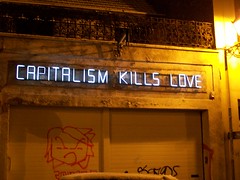Rich begins by considering the perilous interplay of the market and the mind in capitalist culture:Read the whole thing. Rich was literate and literary, an erudite thinker whose poetry and polemics defy cursory treatment. So instead of going on for pages upon pages, allow me to ask a few questions. Does the income inequality inherent in market economies (i.e. “a pyramidic society”) necessarily treat people as “throwaway citizens and workers,” especially when compared to competing economic experiments? Is capitalism entirely—or even mostly—to blame for Prozac prescriptions and public shootings or could other factors be at play? Have market advocates appropriated the word “freedom” in an Orwellian fashion or does it accurately describe one factor in human flourishing?We have become a pyramidic society of the omnivorously acquisitive few, an insecure, dwindling middle class, and a multiplying number of ill-served, throwaway citizens and workers [resulting in] a kind of public breakdown, with symptoms along a spectrum from acute self-involvement to extreme anxiety to individual and group violence.Exactly two decades after E.F. Schumacher’s ennobling case for reimagining capitalist society to prioritize people over products and creativity over consumption, Rich laments “the self-congratulatory self-promotion of capitalism” around the world and considers “the corruptions of language employed to manage our perceptions of all this”—for, lest we forget, the space between words and their true meanings is vast and filled with the fog of confusion. She writes:In the vocabulary kidnapped from liberatory politics, no word has been so pimped as freedom.
[…]
Capitalism presents itself as obedience to a law of nature, man’s “natural” and overwhelming predisposition toward activity that is competitive, aggressive, and acquisitive. Where capitalism invokes freedom, it means the freedom of capital. Where, in any mainstream public discourse, is this self-referential monologue put to the question?
I’m no Randian evangelist. I’m in general agreement with P.J. O’Rourke’s assertion that capitalism is “the worst economic system anyone ever invented, except for all the others.” The great irony of Rich’s distaste for the free market is that it’s recorded in her book Arts of the Possible. Which is available for $14.69 at Amazon.com. Or $9.99 if you prefer the convenience of a Kindle. But remember that you can receive the physical copy with free second-day shipping if you’ve joined Amazon Prime. You get it: Her complaint itself is part of the market, a bird kvetching about the wind on which it soars.
Perhaps this would be a good place to recall von Mises’ quote about what markets actually are: “The market is not a place, a thing, or a collective entity. The market is a process, actuated by the interplay of the actions of the various individuals cooperating under the division of labor. The forces determining the—continually changing—state of the market are the value judgments of these individuals and their actions as directed by these value judgments.” It’s simply people in action selecting what they desire and spurning what they dislike. As an artist, I wouldn’t have it any other way. No centralized authority can compel you to pick up the product of my pencil. You do that of your own free will—and I hope what I write makes you want to.
(Picture: CC 2009 by Jeremy hunsinger)


No comments:
Post a Comment